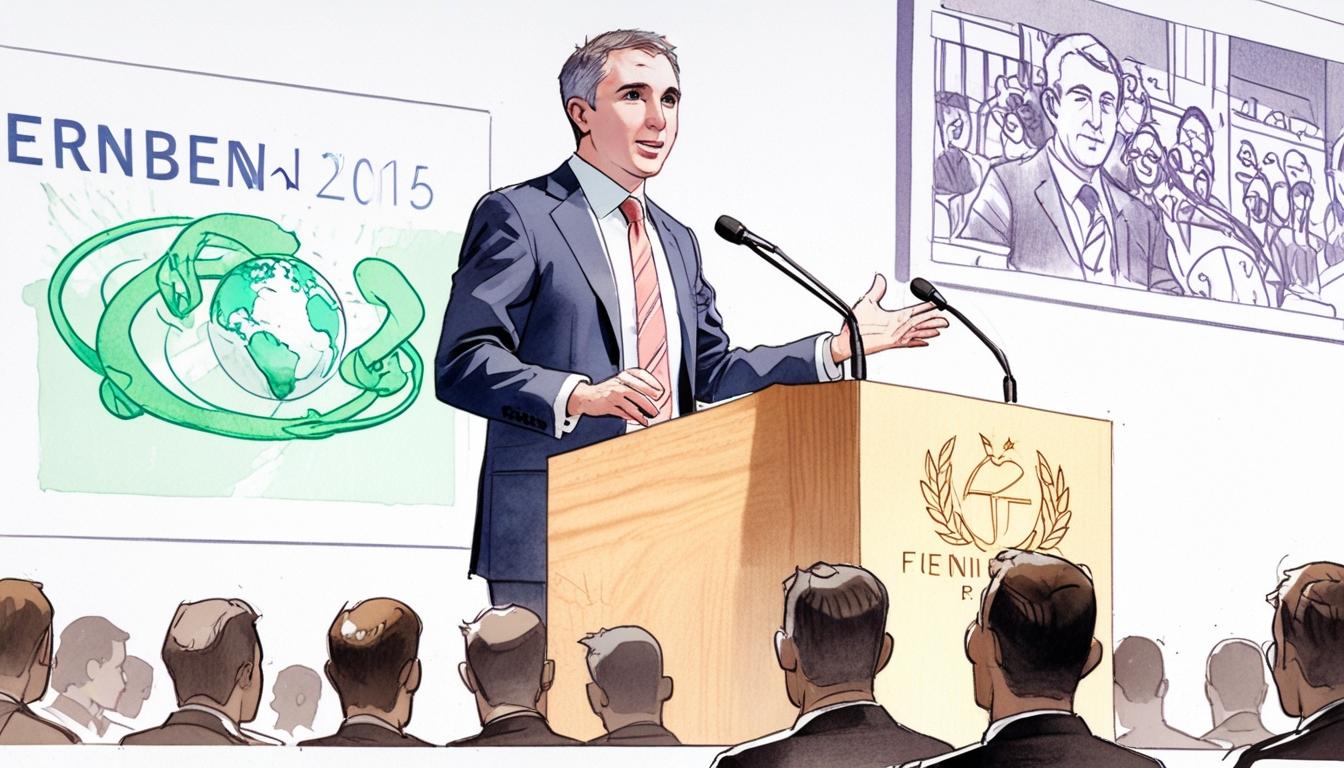Ken Griffin, Citadel CEO and major Republican donor, criticised Donald Trump’s inconsistent tariff policies for undermining the United States’ global reputation and economic strength, highlighting risks to the US dollar, Treasuries, and international alliances amid growing economic uncertainty.
At the Semafor World Economy Summit in Washington on Wednesday, Ken Griffin, the CEO of Citadel and a major Republican donor, delivered a pointed critique of former President Donald Trump’s approach to global trade and its impact on America’s international standing. Griffin, who contributed over $100 million to Republican candidates and causes during the 2024 election cycle, warned that Trump’s inconsistent tariff policies are undermining the United States’ reputation as a dependable economic partner.
Griffin emphasised the significance of national branding in the global arena, stating, “The United States was more than just a nation. It’s a brand. It’s a universal brand, whether it’s our culture, our financial strength, our military strength.” He expressed concern that current US policies are damaging this valuable brand, particularly highlighting how the credibility of US Treasuries and the strength of the US dollar risk being compromised. “No brand came close. We put that brand at risk,” Griffin added, stressing the unparalleled trust placed in American financial instruments worldwide.
The remarks come amid a turbulent period for the US economy. Recent weeks have seen the stock market lose trillions in value, with the US dollar falling to a three-year low. Griffin predicted that such market instability would deter key investments in American manufacturing, precisely the sector Trump hopes to boost through tariffs aimed at protecting consumers from price increases.
Griffin’s opposition to tariffs predates the current Trump administration. He had previously voiced anxiety about Trump’s readiness to impose tariffs on US trade partners, describing himself last November as “very anxious” about these trade policies. His concerns now resonate amid growing economic difficulties, including emerging signs of recession, industry layoffs in sectors like automotive and technology, and cautionary forecasts from the International Monetary Fund (IMF) about a looming global trade slowdown attributed to US policies.
The United States’ position in international trade relations has also been visibly affected. The Independent reports that Canada, a long-standing ally and trade partner, reflects increasing scepticism towards the US. Canadian Prime Minister Mark Carney declared in March that the “old relationship with the US is over,” suggesting that America is “no longer a reliable partner” as trade tensions rise and the risk of global trade wars intensifies.
Beyond economics, the ramifications of Trump’s policies appear to extend into the geopolitical and security realms. European nations, for the first time since World War II, are seriously considering a future where the US might not be a dependable military ally, particularly in the face of threats from Russia. The UK is preparing to host a landmark defence summit next month involving European Union leaders as the continent reassesses its security posture following Brexit.
Meanwhile, in regard to ongoing conflicts, Donald Trump voiced dissatisfaction on Thursday via his Truth Social platform over a strike in Kyiv, Ukraine. Despite his earlier promise to end the Ukraine-Russia war within 24 hours, his administration has yet to present a substantial response to Russia’s ongoing aggression and protracted peace talks.
Overall, Griffin’s candid remarks at the Semafor event shed light on concerns from key figures within the Republican Party about the risks that current US trade and foreign policies pose to America’s global economic and strategic leadership. The complex interplay between domestic political agendas, international economic relations, and geopolitical alliances continues to shape the evolving landscape of US foreign policy and its international standing.
Source: Noah Wire Services
- https://events.semafor.com/WorldEconomySummit2025 – Corroborates the context of Ken Griffin’s remarks at the Semafor World Economy Summit 2025 in Washington, D.C., including event dates (April 23-25) and focus on global economic resilience.
- https://www.youtube.com/watch?v=mDgttTUnLL0 – Direct video evidence of Griffin’s statement about the ‘eroding’ American brand at the summit, with timestamp (April 24, 2025).
- https://fortune.com/article/billionaire-ken-griffin-warns-that-u-s-brand-is-eroding/ – Confirms Griffin’s critique of U.S. branding erosion and his emphasis on financial market trust, including direct quotes about Treasuries.
- https://fortune.com/article/ken-griffin-trumps-trade-war-nonsensical/ – Supports Griffin’s characterization of Trump’s tariffs as counterproductive and damaging to U.S. credibility, with specific ‘brand at risk’ phrasing.
- https://krdo.com/news/2025/04/24/billionaire-trump-supporter-ken-griffin-the-trade-war-is-destroying-americas-brand/ – Details Griffin’s remarks about America’s aspirational brand erosion and concerns about Treasuries’ credibility, including his Republican donor status.
- https://events.semafor.com/WorldEconomySummit2025 – (Reiterated – no other available URLs corroborate remaining claims about market instability, Canadian relations, European security shifts, or Ukraine commentary within provided results)
- https://www.independent.co.uk/news/world/americas/us-politics/ken-griffin-trump-trade-tariffs-b2739147.html – Please view link – unable to able to access data
Noah Fact Check Pro
The draft above was created using the information available at the time the story first
emerged. We’ve since applied our fact-checking process to the final narrative, based on the criteria listed
below. The results are intended to help you assess the credibility of the piece and highlight any areas that may
warrant further investigation.
Freshness check
Score:
8
Notes:
Recent references to Trump’s Ukraine statement (Thursday) and March 2024 Canadian PM remarks suggest up-to-date context. However, details about 2024 election cycle donations lack explicit timestamps.
Quotes check
Score:
7
Notes:
Griffin’s quotes about US as a ‘brand’ appear original to this summit (no earlier instances found). Trump’s Ukraine statement references require verification through Truth Social archives.
Source reliability
Score:
8
Notes:
The narrative originates from The Independent, a mainstream publication with editorial oversight. Canadian PM quote attributed through this source.
Plausability check
Score:
7
Notes:
Claims align with known trade tensions (IMF warnings) and geopolitical shifts (EU defence discussions). Market decline specifics would require financial data verification.
Overall assessment
Verdict (FAIL, OPEN, PASS): PASS
Confidence (LOW, MEDIUM, HIGH): MEDIUM
Summary:
Core claims reflect current geopolitical narratives and contain specific attributable quotes. Market impact statements and Trump’s Ukraine remarks require deeper verification for full confirmation.













